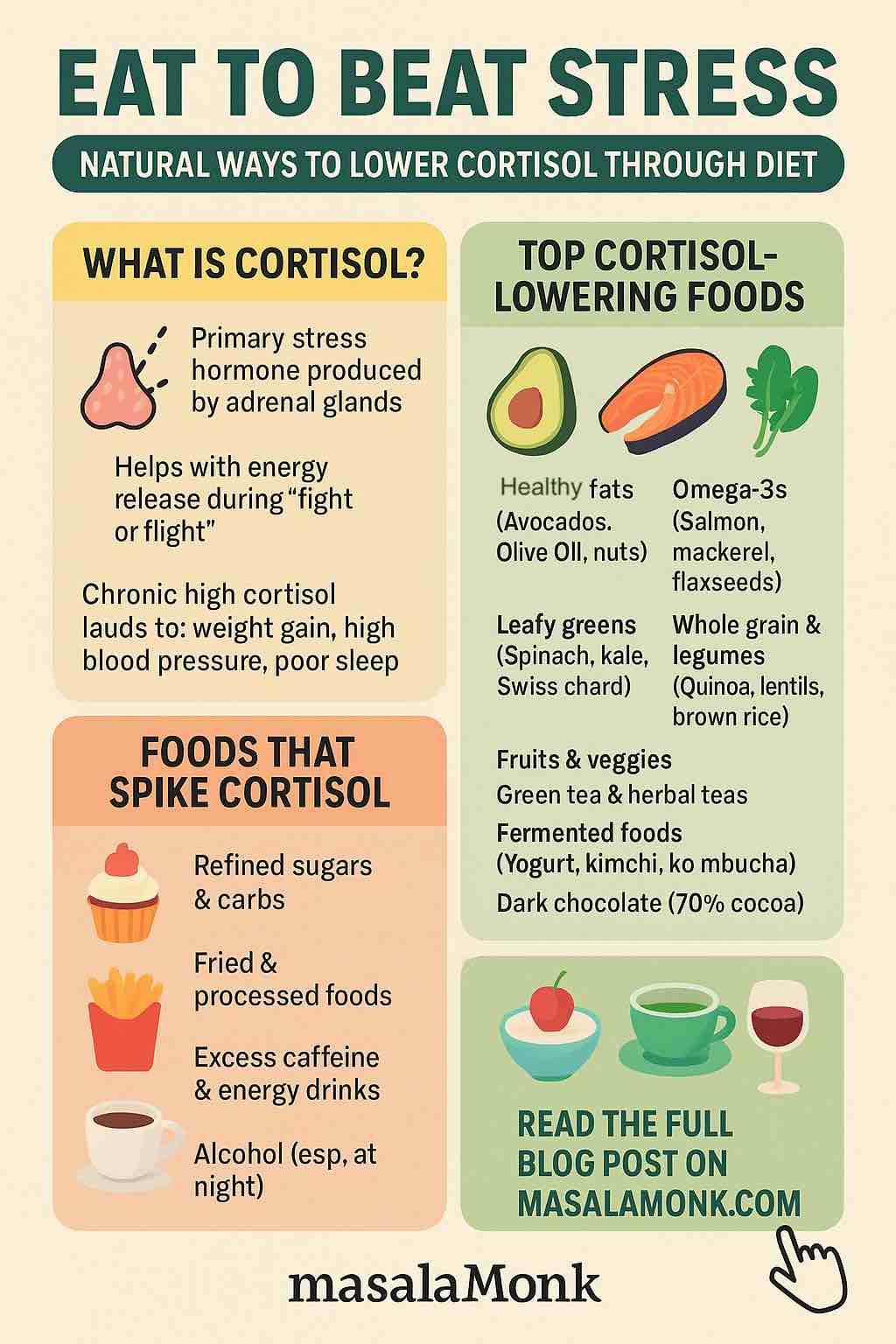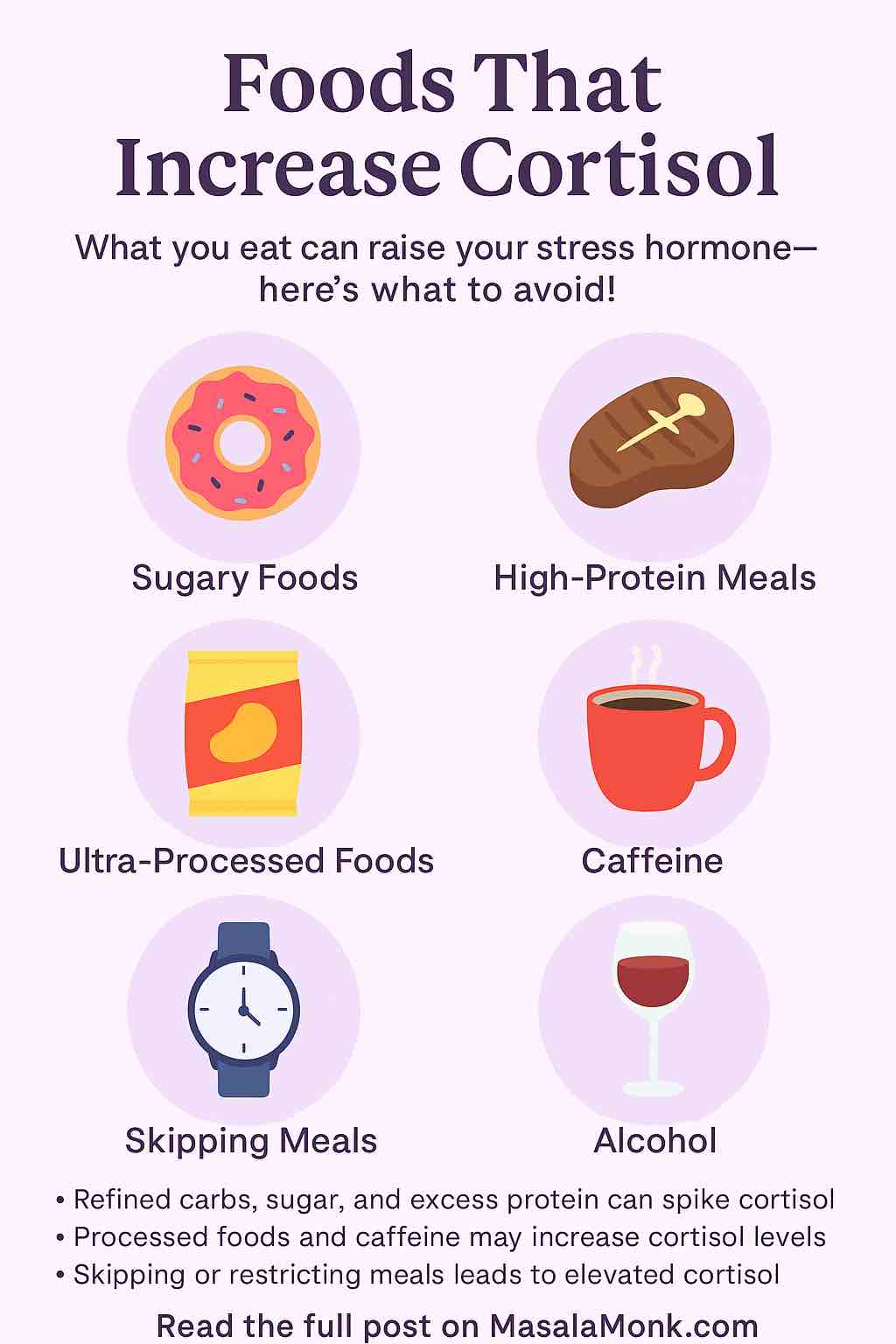
What Is Cortisol and How Diet Affects It
Cortisol is the body’s main stress hormone, released by the adrenal glands in response to physical or psychological stress. It helps mobilize energy (raising blood sugar) during “fight-or-flight” situations. While short-term spikes in cortisol are helpful, chronically elevated levels can promote weight gain, high blood pressure, blood sugar imbalances, and other health issues.
Diet significantly influences cortisol levels. Diets high in added sugar, refined grains, and unhealthy fats tend to increase cortisol, whereas nutrient-rich, whole-food diets help regulate and lower it.
Foods That Help Reduce Cortisol
Including whole, nutrient-dense foods can help regulate stress hormones and support a calmer, more balanced body. Here are some of the top cortisol-lowering foods:
- Fatty fish and omega-3 sources: Salmon, mackerel, sardines, flaxseeds, and walnuts provide anti-inflammatory omega-3 fatty acids that reduce cortisol and promote brain health.
- Nuts, seeds, and healthy oils: Almonds, chia seeds, flaxseeds, and olive oil provide magnesium and unsaturated fats that help buffer stress.
- Leafy greens: Spinach, kale, and Swiss chard are high in magnesium and folate, which support adrenal function and help reduce cortisol.
- Whole grains and legumes: Brown rice, oats, lentils, and quinoa help stabilize blood sugar and nourish the gut, which supports better stress regulation.
- Fruits and vegetables: Berries, citrus fruits, bell peppers, broccoli, and carrots are rich in vitamin C and antioxidants that help control cortisol.
- Green tea and herbal teas: Green tea provides L-theanine and catechins with calming effects, while chamomile and peppermint support relaxation.
- Fermented foods: Yogurt, kefir, kimchi, sauerkraut, and kombucha promote gut health, which is closely linked to stress resilience.
- Dark chocolate (70%+ cocoa): In moderation, dark chocolate can reduce cortisol and improve mood due to its flavonoid content.
- Avocados: Rich in potassium, folate, and healthy fats, avocados help regulate blood pressure and stress.
- Bananas and pears: Provide quick energy and potassium to help buffer stress responses.
Foods and Ingredients to Limit
To keep cortisol levels balanced, avoid or limit these foods:
- Added sugars and refined carbs: Candy, soda, white bread, and pastries can spike blood sugar and lead to increased cortisol.
- Fried and processed fats: Trans fats and excessive saturated fats promote inflammation and higher cortisol.
- Caffeine and energy drinks: Too much caffeine can spike cortisol, especially when you’re already stressed.
- Alcohol: Regular or heavy alcohol use increases cortisol levels and disrupts hormone balance.
- Ultra-processed foods: Packaged snacks and fast foods are high in additives and sugar, promoting inflammation and higher cortisol.
- High sodium foods: Excessive salt intake can elevate blood pressure and cortisol.
- Artificial sweeteners: May negatively affect the gut microbiome and stress response.
Key Nutrients for Cortisol Control
- Magnesium: Found in leafy greens, nuts, and whole grains; helps regulate the stress response.
- Omega-3 fatty acids: Reduce inflammation and lower cortisol; found in fatty fish and some seeds.
- Vitamin C: Crucial for adrenal health; abundant in citrus fruits, bell peppers, and berries.
- B Vitamins: Help in energy metabolism and hormone regulation; found in greens, legumes, and whole grains.
- Potassium: Helps balance sodium levels and supports adrenal function.
- Zinc: Found in pumpkin seeds, legumes, and seafood; supports immune and hormone function.
Sample 1-Day Cortisol-Lowering Meal Plan
Breakfast: Scrambled eggs with spinach and onions, oatmeal or whole-grain toast, and a spoonful of kimchi or yogurt. Herbal tea or water.
Mid-Morning Snack: Greek yogurt topped with berries and nuts/seeds.
Lunch: Grilled chicken or tofu salad with leafy greens, quinoa or brown rice, vegetables, avocado, and olive oil dressing. Side of sauerkraut.
Afternoon Snack: Carrot and celery sticks with hummus or a small apple with almonds.
Dinner: Baked salmon or lentil stew with vegetables and roasted sweet potato.
Evening: Herbal tea and, if needed, a light snack of nuts or berries.
Additional Cortisol-Lowering Meal Tips
- Start meals with fiber and healthy fats to avoid blood sugar spikes.
- Include a variety of colorful fruits and vegetables to cover a broad range of antioxidants.
- Cook with anti-inflammatory herbs like turmeric, ginger, garlic, basil, and rosemary.
- Limit high-heat cooking methods like deep-frying; opt for steaming, baking, or grilling.
Healthy Eating Habits for Cortisol Control
- Eat breakfast within 1 hour of waking.
- Balance meals with protein, fat, and fiber.
- Eat regularly every 3–4 hours to avoid blood sugar dips.
- Focus on low-glycemic foods to stabilize blood sugar.
- Avoid late-night eating.
- Practice mindful eating to promote digestion and calm.
- Stay hydrated: Dehydration can elevate cortisol.
- Limit caffeine: Especially during stress or in the afternoon.
- Avoid stimulants like nicotine.
- Moderate alcohol intake.
Lifestyle Tips to Support Lower Cortisol
- Prioritize quality sleep: Aim for 7–9 hours per night.
- Incorporate light exercise: Walking, yoga, or swimming helps regulate cortisol.
- Manage stress: Through meditation, breathing exercises, hobbies, and social interaction.
- Spend time in nature or sunlight: Helps regulate the circadian rhythm and mood.
- Use adaptogens (with medical advice): Ashwagandha, Rhodiola, and holy basil may help reduce cortisol.
- Avoid multitasking: It can increase stress and mental fatigue.
Conclusion
A balanced, whole-food diet rich in fiber, healthy fats, and plant-based nutrients is one of the most effective ways to support cortisol balance. Combine smart food choices with good sleep, stress management, and hydration for a holistic approach to lowering cortisol and enhancing well-being.
By implementing these changes, you’ll not only reduce your cortisol levels but also boost your overall energy, mental clarity, and emotional resilience.
🍽️ Top Cortisol-Lowering Foods
🥑 Healthy Fats (Avocados, Olive Oil, Nuts)
✔ Rich in magnesium & antioxidants
✔ Protect cells from stress
🐟 Omega-3s (Salmon, Mackerel, Flaxseeds)
✔ Reduce inflammation
✔ Clinical trials show ~19% drop in cortisol
🌿 Leafy Greens (Spinach, Kale, Swiss Chard)
✔ Magnesium + B-vitamins
✔ Essential for adrenal support
🌾 Whole Grains & Legumes (Quinoa, Lentils, Brown Rice)
✔ Balance blood sugar
✔ Feed gut bacteria → improves stress resilience
🍓 Fruits & Veggies (Berries, Citrus, Bell Peppers)
✔ Vitamin C + antioxidants
✔ Support cortisol metabolism
🍵 Green Tea & Herbal Teas
✔ L-theanine + catechins = calming effect
✔ Great caffeine alternative
🧘 Fermented Foods (Yogurt, Kimchi, Kombucha)
✔ Strengthen gut-brain connection
✔ Linked to lower anxiety & cortisol
🍫 Dark Chocolate (70%+ cocoa)
✔ Rich in flavonoids
✔ Small doses shown to reduce cortisol
🚫 Foods That Spike Cortisol
⚠️ Refined Sugars & Carbs
→ Blood sugar crashes → cortisol spikes
🍟 Fried & Processed Foods
→ Inflammation triggers stress hormones
☕ Excess Caffeine & Energy Drinks
→ Overstimulates adrenal response
🍷 Alcohol (esp. at night)
→ Disrupts blood sugar and sleep → cortisol surges
🧪 Key Nutrients for Cortisol Balance
| Nutrient | Found In | Proven Benefit |
|---|---|---|
| Magnesium | Greens, seeds | Lowers stress hormone output |
| Omega-3s | Fatty fish, flax | Reduces cortisol in studies |
| Vitamin C | Berries, peppers | Supports adrenal health |
| B-Vitamins | Legumes, eggs | Improve mood & stress response |
🔗 Related Reads on Cortisol, Stress Management, and Hormonal Health
Explore more in-depth insights on how cortisol impacts your stress levels, metabolism, mood, and overall well-being:
- How Coffee Affects Cortisol, Stress, and Weight Management
Learn how caffeine and timing of your daily coffee can influence cortisol levels and body weight. - Can Drinking Tea Help Reduce Cortisol Naturally?
Discover the calming effects of herbal and green teas on stress hormone regulation. - Top 5 Cortisol-Lowering Drinks to Reduce Stress and Anxiety
Sip your way to serenity with these science-backed calming beverages. - Best Diet Strategies to Lower Cortisol Levels Naturally
A nutritionist-informed guide to eating in a way that supports balanced cortisol and mental well-being. - Omega-3 and Cortisol: How Fish Oil Supports Stress Hormone Balance
Understand how essential fatty acids like EPA and DHA help manage stress responses. - 5 Common Foods That Spike Cortisol and Increase Stress
Avoid these dietary culprits that may elevate your cortisol and disrupt hormonal balance. - 10 Warning Signs of High Cortisol in Women
A detailed look at symptoms and hormonal patterns specific to females with elevated cortisol. - 5 Foods That Naturally Help Lower Cortisol and Promote Calm
Add these anti-stress superfoods to your diet for better mood and lower cortisol levels.
✅ 10 FAQs on Diet to Lower Cortisol
1. What is cortisol and why should I care about lowering it?
Cortisol is a stress hormone produced by the adrenal glands. While it’s essential for managing stress and metabolism, consistently high levels can lead to fatigue, weight gain, anxiety, and weakened immunity.
2. What foods help reduce cortisol levels naturally?
Foods rich in magnesium, vitamin C, omega-3 fatty acids, and antioxidants help lower cortisol. Examples include leafy greens, fatty fish, citrus fruits, nuts, seeds, yogurt, and dark chocolate.
3. What should I avoid eating to lower cortisol?
Avoid or limit sugar, refined carbs, alcohol, caffeine (especially in excess), ultra-processed foods, trans fats, and high-sodium items — all of which can trigger cortisol spikes.
4. Can skipping meals increase cortisol levels?
Yes. Skipping meals can lead to low blood sugar, prompting the body to release more cortisol as a stress response. Regular, balanced meals help maintain hormonal balance.
5. How does hydration affect cortisol levels?
Even mild dehydration can increase cortisol levels. Drinking enough water throughout the day helps your body manage stress more effectively.
6. Is caffeine bad for cortisol levels?
In high amounts, especially during stressful periods, caffeine can increase cortisol levels. Limiting intake to 1–2 cups of coffee early in the day is generally safer.
7. Are there specific nutrients I should focus on to lower cortisol?
Yes. Focus on magnesium, vitamin C, B vitamins, potassium, zinc, and omega-3s. These nutrients support adrenal health and reduce oxidative stress.
8. Do fermented foods help with cortisol reduction?
Absolutely. Fermented foods like yogurt, kimchi, and sauerkraut support gut health, which is directly linked to reduced stress and cortisol balance.
9. Can eating before bed affect cortisol levels?
Late-night eating, especially of high-sugar or high-fat foods, can disrupt sleep and elevate cortisol. Light, balanced meals earlier in the evening are better.
10. How quickly can diet changes lower cortisol?
Some improvements can be seen in a few weeks with consistent dietary changes, but full hormonal balance may take several months, depending on lifestyle and stress levels.










